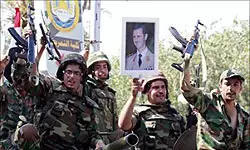Syrian Army Repels Foreign Terrorist Attack on Damascus Refugee Camp

 The Syrian army and security forces repelled a terrorist attack on al-Yarmouk Palestinian refugee camp in Southern Damascus on Saturday.
The Syrian army and security forces repelled a terrorist attack on al-Yarmouk Palestinian refugee camp in Southern Damascus on Saturday.
The foreign terrorists planned to attack the camp, located in al-Tazamon district in Southern Damascus, in several directions but they faced the rigid resistance of the Syrian army and were repelled and further driven out of the area.
A least ten terrorists were killed during clashes with the army in al-Tazamon district.
Also today, the Syrian army discovered and defused a car bomb in downtown Damascus.
The army continued its operations across Syria on Saturday to purge remnants of terrorist groups from different towns and cities.
In a battle with armed rebels in Reef (outskirts) Damascus, the Syrian army killed a large number of terrorists, and injured many others.
The army also identified three pick-up vans packed with terrorists in Aleppo, Syria’s second largest city and purged them from the city after some clashes.
In Idlib near the Turkish border, the Syrian army also arrested many terrorists with non-Syrian nationalities.
Throughout the past several days, the terrorists have tried to make several Syrian cities unsafe for citizens, but the army has purged them from most neighborhoods and districts, killed tens of terrorists and arrested many others.
Syria has been experiencing unrest since March 2011 with organized attacks by well-armed gangs against Syrian police forces and border guards being reported across the country.
Hundreds of people, including members of the security forces, have been killed, when some protest rallies turned into armed clashes.
The government blames outlaws, saboteurs, and armed terrorist groups for the deaths, stressing that the unrest is being orchestrated from abroad.
In October 2011, calm was eventually restored in the Arab state after President Assad started a reform initiative in the country, but Israel, the US and its Arab allies are seeking hard to bring the country into chaos through any possible means. Tel Aviv, Washington and some Arab capitals have been staging various plots in the hope of increasing unrests in Syria.
The US daily, Washington Post, reported in May that the Syrian rebels and terrorist groups battling the President Bashar al-Assad’s government have received significantly more and better weapons in recent weeks, a crime paid for by the Persian Gulf Arab states and coordinated by the United States.
The newspaper, quoting opposition activists and US and foreign officials, reported that Obama administration officials emphasized the administration has expanded contacts with opposition military forces to provide the Persian Gulf nations with assessments of rebel credibility and command-and-control infrastructure.
According to the report, material is being stockpiled in Damascus, in Idlib near the Turkish border and in Zabadani on the Lebanese border.
Opposition activists who several months ago said the rebels were running out of ammunition said in May that the flow of weapons – most bought on the black market in neighboring countries or from elements of the Syrian military in the past – has significantly increased after a decision by Saudi Arabia, Qatar and other Persian Gulf states to provide millions of dollars in funding each month.







